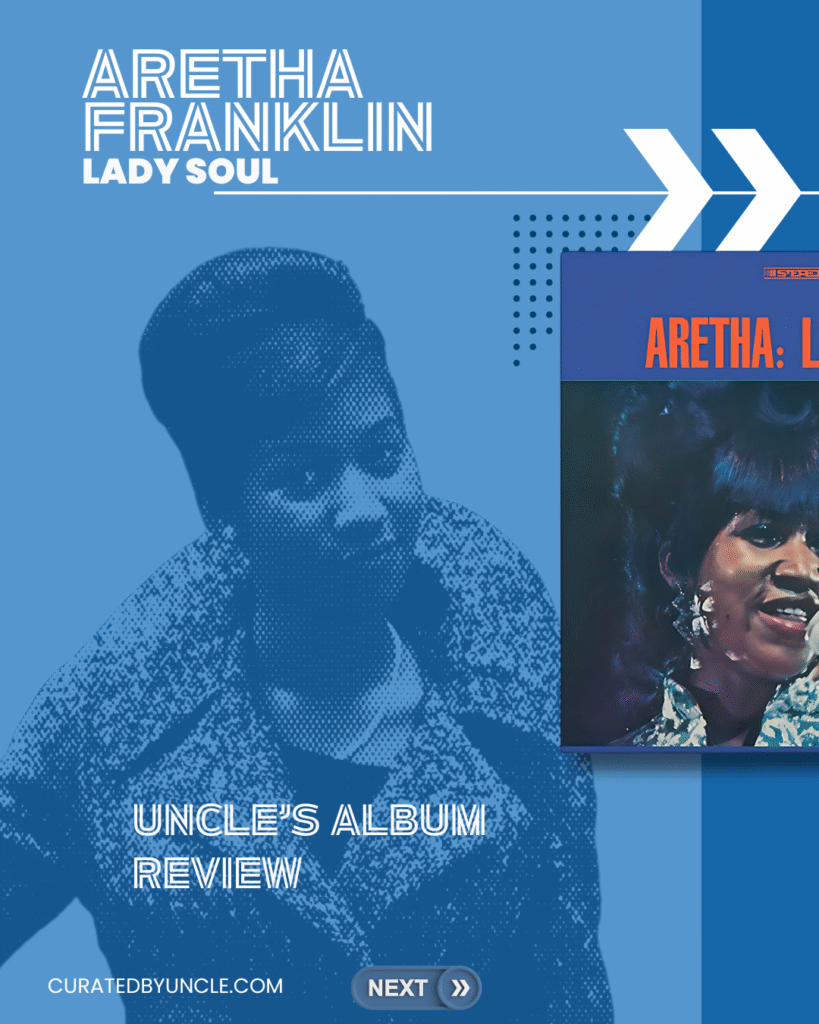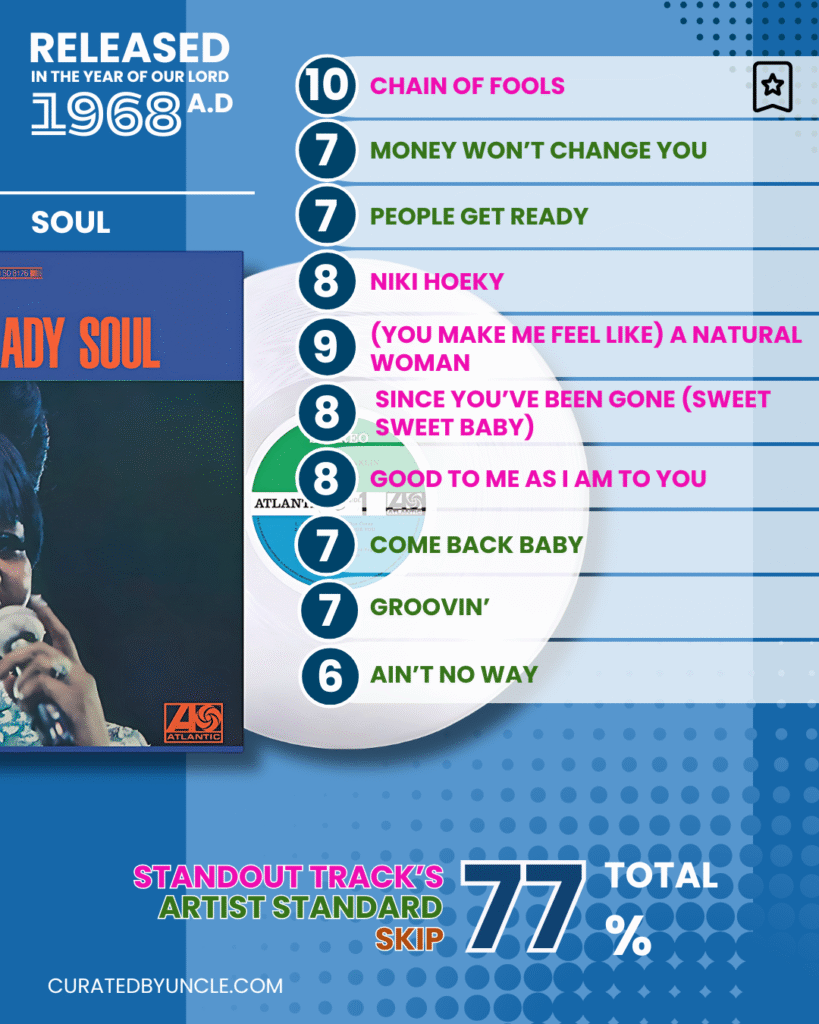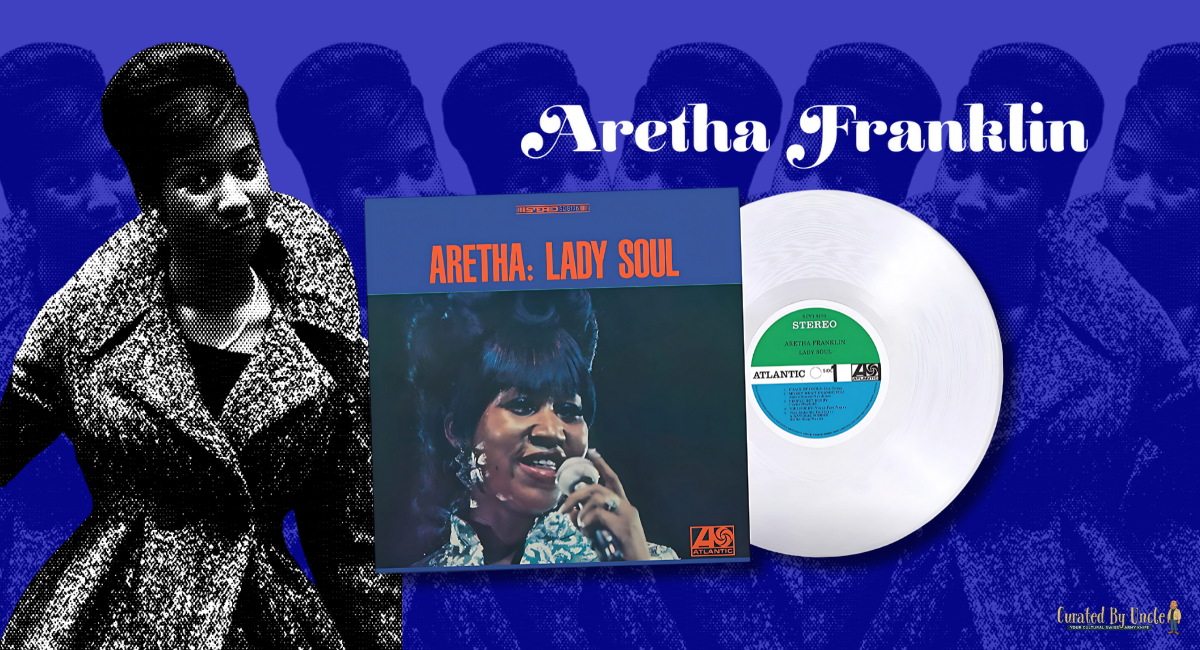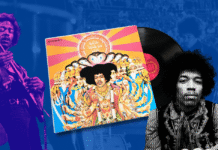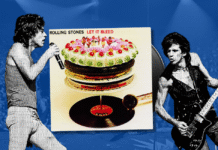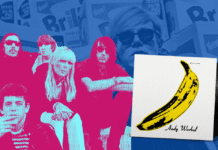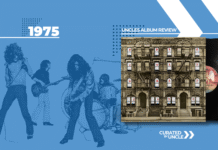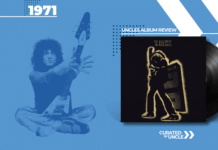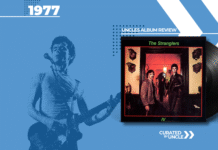Welcome to the Church of Aretha
If Aretha Franklin had only released Lady Soul, she’d still be the Queen. Dropping in January 1968, this was the album that turned vocal supremacy into a cultural sledgehammer. Her voice didn’t just hit notes it demolished them, then rebuilt them in her own image. Lady Soul is 28 minutes of unfiltered gospel fire, lustful yearning, political poise and a masterclass in “you better listen to me, boy.”
I remember first hearing “Chain of Fools” on a crusty AM radio, thinking: so this is what authority sounds like when it’s wrapped in a velvet punch. It’s not just music, it’s command.
Table of Contents
Who’s Testifying?
- Aretha Franklin – vocals, piano, producer, force of nature
- Spooner Oldham – electric piano, organ
- Jimmy Johnson & Joe South – guitars
- Tommy Cogbill & Jerry Jemmott – bass
- Roger Hawkins – drums
- The Sweet Inspirations & Cissy Houston – backing vocals (yes, that’s Whitney’s mum)
- King Curtis – tenor saxophone and pure soul punctuation
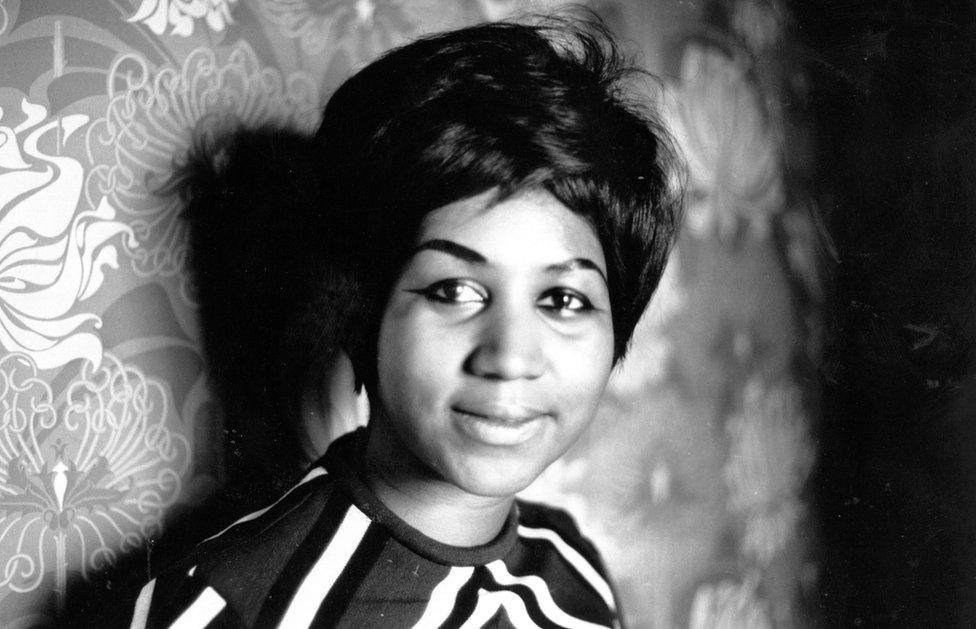
Themes: Heartache, Resistance and Raw Power
There’s heartbreak, yes, but also autonomy. Aretha isn’t begging for love she’s demanding respect. Lady Soul is the gospel according to Aretha Franklin full of love, loss, empowerment and the kind of honesty that makes you squirm.
It’s romantic without being naive, political without being preachy. You come for the voice you stay for the steel beneath it.
Track by Track: Soul Sermons and Sonic Slaps
1. Chain of Fools
That guitar lick is pure swagger. Aretha comes in like a wrecking ball wrapped in gospel robes, cutting through with a voice that sounds half-preacher, half-exorcist. It’s about a no-good man and the emotional prison he keeps her in, but there’s no victimhood here. Just fury, funk and flawless phrasing. This is the best track on Lady Soul
2. Money Won’t Change You
A funky, righteous stomper. Aretha’s delivery shifts between sermon and slap, reminding you that money can’t buy class – or keep her quiet. Backed by syncopated brass and sharp backup vocals, it’s less of a love song and more of a spiritual tongue-lashing. I always imagine this being sung with a raised eyebrow and a cigarette still smouldering.
3. People Get Ready
A Curtis Mayfield cover soaked in gospel reverence. Aretha’s version is quieter, slower, more contemplative. You can practically feel the church pews and the Sunday heat. It’s not just a cover, it’s a benediction. Her phrasing here is subtle brilliance – soulful without ever becoming showy. It gave me chills the first time, and still does.
4. Niki Hoeky
A swampy, funky outlier. Imagine Aretha got lost in a Louisiana bayou and came back with a tambourine and an attitude. It’s a little bonkers, honestly half novelty, half fever dream but she owns it. Not essential, but fun. Like your aunt showing up to karaoke and slaying it, just because she can.
5. (You Make Me Feel Like) A Natural Woman
Written by Carole King, this is emotional evisceration via melody. Aretha turns a nice song into an immortal performance. Every syllable feels lived-in. It’s sensual without being salacious, powerful without being pushy. This is the vocal equivalent of a velvet sledgehammer. A song that makes you stop mid-sentence and whisper “damn.”
6. Since You’ve Been Gone (Sweet Sweet Baby)
An upbeat, brassy banger that dances around heartbreak with tambourine shakes and horn stabs. The way she phrases “sweet, sweet baby” it’s both adoring and accusatory. This one’s always struck me as the soul version of angrily dancing in your kitchen with a wine glass. Cathartic, catchy and just the right amount of bitter.
7. Good to Me As I Am to You
A slow-burning blues ballad with a sultry edge. Aretha doesn’t beg, she negotiates. The guitar licks from Eric Clapton (yes, that Clapton) slide in and out like smoke rings. It’s smoky, woozy and absolutely riveting. A song for late nights, dim lights and emotional honesty.
8. Come Back Baby
Another cover, this time of Ray Charles. Aretha transforms it into something dirtier, rawer and even more pleading. Her piano playing is particularly lovely here, minimal but expressive. You get the sense that if the man doesn’t come back, she’ll be just fine… after flipping a few tables.
9. Groovin’
Originally by The Young Rascals, this cover is lighter than most of the album. It feels like a summer breeze in the middle of a thunderstorm. Easygoing, flirtatious and vocally effortless. It’s not the showstopper here, but it’s a lovely palette cleanser before the finale.
10. Ain’t No Way
Written by her sister Carolyn, this is as close as the album gets to operatic drama. It’s all build, ache and release. Cissy Houston’s soaring background vocals elevate Aretha’s main vocal into the stratosphere. It’s pure emotional combustion. The final plea “ain’t no way for me to love you” feels like both surrender and revolution.
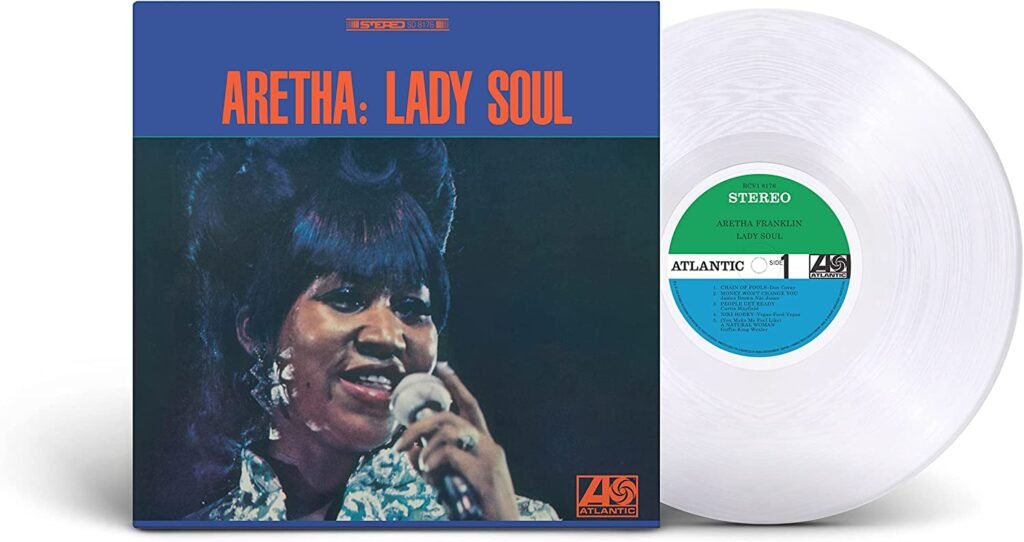
Artwork: Holy Glamour
The cover is a soft-focus portrait of Aretha, eyes closed, lost in the moment, dripping confidence. It’s less an album cover than a visual sermon. Even frozen in 2D, you get the sense she could reduce you to emotional pulp in five notes flat.
The hair? Flawless. The poise? Regal. The mood? Come and get saved.
Production: Southern Soul, Northern Precision
Recorded primarily at Atlantic Studios in New York and backed by the tight-as-hell Muscle Shoals Rhythm Section, Lady Soul is a triumph of transatlantic soulcraft. Produced by Jerry Wexler (the man who practically invented the term “Rhythm and Blues”), the album is drenched in authenticity.
The mix is warm but punchy, capturing Aretha’s raw, church-honed vocals while framing them with just the right amount of grit. It’s spiritual, it’s sensual and it sounds like it was recorded by people who meant every single note.
Trivia: Gospel Truths and Soul Secrets
- The backing vocals on “Ain’t No Way” were performed by Cissy Houston mother of future soul icon Whitney Houston.
- Eric Clapton played uncredited guitar on “Good to Me As I Am to You” a rare cameo that almost no one notices.
- The album’s working title was almost Soul Sister before settling on Lady Soul.
- Aretha was just 25 years old when she recorded this.
- Lady Soul became her second consecutive #1 R&B album.
- Franklin’s vocal range on this album spans nearly three octaves.
Legacy: Still Wearing the Crown
Lady Soul didn’t just top the R&B charts, it broke into the mainstream like a battering ram. It cemented Aretha’s reign as the Queen of Soul and influenced generations. Rolling Stone routinely ranks it among the greatest albums of all time. It was inducted into the Grammy Hall of Fame. Everyone from Whitney to Beyoncé owes her a tithe.
And it still sounds fresh. That’s the terrifying part. In a world drowning in vocal effects and AI warbling, Lady Soul stands tall no autotune, just unfiltered human brilliance.
My Final Thoughts: All Hail
I think Lady Soul is essential. Not just as a soul album, but as a historical document, a feminist blueprint and a vocal gauntlet no one’s really matched since. If you’ve never listened to it in full, clear 28 minutes from your schedule and prepare for the emotional equivalent of being steamrolled by grace.
Aretha isn’t just a singer, she’s a force field. And Lady Soul is her most concentrated blast.

If You Liked Lady Soul, I Recommend These:
- Otis Redding – Otis Blue (1965): Southern soul with rawness and grit.
- Etta James – Tell Mama (1968): Another masterclass in vocal passion.
- Beyoncé – Lemonade (2016): Modern soul fury, standing on Aretha’s shoulders.
